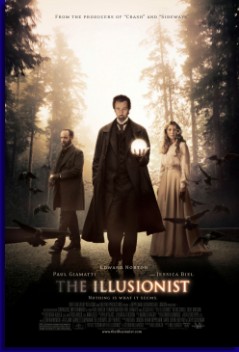

Reviewed by
Bud Carlson

In Steven Millhauser’s book of short stories titled “The Barnum Museum”, the story of “Eisenheim the Illusionist” is told. It deals with crossing the boundaries between art and life, appearance and reality. Eisenheim is a stage magician in turn-of-the-century Vienna , and his feats make David Copperfield look like an amateur. This short story is the basis for “The Illusionist,” Neil Burger’s feature film.
The story begins with the boy Eisenheim walking down an isolated path through a field, when he happens upon an unusual old man sitting beneath an unusual old tree. The boy speaks to the man, and the man performs illusions and other magic tricks for him. Eisenheim turns around in the field, only to find that the man has disappeared. After he looks around for the man, he returns to find that the tree has disappeared as well. Eisenheim is inspired by this encounter, and as he grows up, he is isolated and introverted, far more content to be alone in a corner working on sleights of hand, rather than playing with other kids. A few years later, as Eisenheim (the teen) has begun to take magic to a new level, he meets Sophie. She is a beautiful and charming young woman from a rich and powerful family, and is the only child able to break through Eisenheim’s seclusion. Their relationship is forbidden (Eisenheim is but the son of a cabinetmaker), yet they find opportunities to sneak away and spend time together, and a teen romance develops. Finally, the police (who are largely controlled by Sophie’s family) catch on to them, and keep her from sneaking away to meet Eisenheim. Eisenheim goes into exile, traveling the world and perfecting his illusions.
The pair don’t meet up again until probably 15 years later. Eisenheim (played by Edward Norton) returns to Vienna as a stage magician, with an act that amazes his audiences and garners rave reviews. This draws the attention of Prince Leopold


(played by Rufus Sewell), and he and his fiancÚ Sophie (yes that Sophie, played by the lovely Jessica Biel) attend a performance. When Sophie is called upon to assist the magician onstage, Eisenheim and Sophie recognize one another from their childhood relationship, and a dormant love affair is rekindled. As the clandestine romance becomes harder and harder for the two to control, Leopold charges Chief Inspector Uhl (played by Paul Giamatti) with exposing Eisenheim and shutting him down, and Eisenheim prepares to pull off his greatest illusion yet.
“Stories, like conjuring tricks, are invented because history is inadequate to our dreams” – Steven Millhauser.
The movie that Neil Burger creates with “The Illusionist” is, indeed, close to being a dream. It is an atmospheric and moody look at magic and at love. The characters are nicely developed, and the romance in the story is believable (which is a nice change from the trash that we have seen from the romance category of films, and most especially the romantic comedy genre recently). So many of the romantic tales we have seen lately has been contrived and formulaic, while the relationships in this film are more than different enough so as to fall outside of “the formula”, and I found them to be refreshing. Issues of magic and illusion run throughout the movie, which requires that the viewer on his/her toes, in ways that most romances have not been able to do. Some will complain that there isn’t enough passion, enough heat so to speak, between Sophie and Eisenheim. To this I say “thank goodness”, because this movie would have suffered badly at any over-acting and foolishness on the part of these two characters. Remember, these are characters who are too smart and too wiley to go running off all willy-nilly and let passion rule the day. They will win the chance to be together in their own way.
In Norton and Giamatti, we have two of the best actors in the business today, and I believe each delivers intelligent and well-interpreted performances. The two of them are terrific in their scenes together, playing two smart and composed characters who respect each other’s competencies, even as they come out on opposite sides of the issues.
It is a narrative film, as good as we have seen recently. And if you are willing to be drawn in by the period settings, the intricate plot, and the intriguing characters, this movie is worth seeing.
